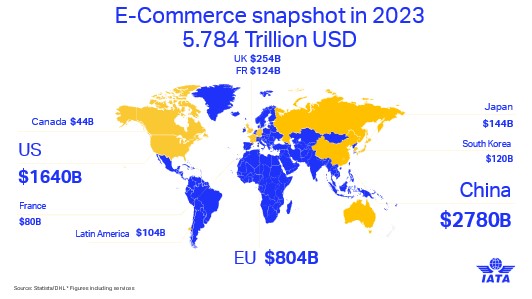
E-commerce emerged as a crucial lifeline for both the air cargo supply chain and homebound consumers, during the pandemic. Following a COVID-induced surge, where eCommerce grew by approximately 30%, the sector's growth has moderated but remains robust, expanding at a double-digit rate of 10-12% post-pandemic. Despite challenges such as geopolitical tensions, inflation, and currency instability impacting consumer spending power, eCommerce has risen to the occasion, offering cost-effective solutions.

Projected to hit USD 6.4 trillion by 2024, the eCommerce sector relies heavily on air cargo, accounting for transporting 80% of cross-border eCommerce goods. Today’s consumers demand real-time updates on the location and condition of their items during transit, necessitating enhanced digitalization and data integration. IATA's ONE Record initiative is a prime example of this digital shift, providing a unified data sharing standard that boosts air cargo operational efficiency. Some airlines are at the forefront of the digital transformation journey, implementing APIs and cutting-edge cargo tracking technologies.
Sustainability has also become a pivotal consideration in eCommerce, not only to meet the sustainability objectives of the consumer but to meet the industry’s goal of net zero carbon emissions by 2050 and adhere to Environmental, Social, and Governance (ESG) standards. IATA is working to support the energy transition of the industry through supporting effective carbon calculations and offsetting through the development of accurate and standardized emissions calculation methodology. IATA will launch the CO2 Connect for Cargo later this year- a precise tool for calculating emissions from operations.
However, the rise in eCommerce is not without its challenges, particularly in transporting lithium battery-powered electronics, including smartphones, toys, and laptops. Managing the safety risks associated with the transport of lithium batteries is paramount. Last year, significant regulatory measures were implemented by IATA and the International Civil Aviation Organization (ICAO). New guidelines dictate that lithium batteries must not exceed 30% of their full charge capacity during transport. Additionally, ICAO's Annex 18 update "Safe Transport of Dangerous Goods by Air", includes provisions for overseeing and managing the safety of the supply chain for transporting dangerous goods by air and the need for governments to hold non-compliant shippers accountable.
Navigating the complex environment of international regulations is essential for the seamless flow of global eCommerce. Adherence to customs, security, and safety standards is imperative. Keeping up with regulatory changes and maintaining strong relations with regulatory bodies are key to smooth operations. The increasing volume of goods adds complexity to the process. IATA continues to collaborate with the World Customs Organization (WCO) to ensure secure and efficient trade, focusing on easing the challenges faced by stakeholders at border crossings.
The air cargo market in 2023 was significantly shaped by the ongoing growth in eCommerce, leading to increased digitalization, a greater focus on sustainability and tighter requirements for the transport of items containing lithium batteries. As the shift in consumer behavior towards online shopping and the global expansion of eCommerce continues into 2024, these priorities will continue to top the agenda.
Andre Majeres
Head of eCommerce & Cargo Operations, IATA